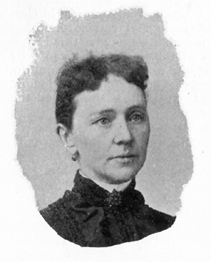IS LABOR DIGNIFIED?*
By MRS. O. R. LAKE.

|
| MRS. LEONORA MARIE LAKE. |
Writers of ancient and modern times, whether in poetry or prose, in refering to labor, have always quoted it as being "noble, holy and dignified." These sentiments are undoubtedly due to the fact that the Master when on earth occupied Himself with manual labor. Labor is noble, when the laborer fully realizes the grandeur of the Creation and the wonderful power which placed within human reach all those possibilities and resources which, when manipulated by the skill and industry of man, supply all the comforts and necessaries of life. Labor is holy; first, because to labor is a part of the Divine command, and when fulfilling this or any other command of God one must of a necessity feel more closely in touch with holiness. Labor is holy also when the individual is engaged in that particular phase of human activity for which he has natural aptitude or inherent love. For instance, how often do we hear it said of a person, he or she, as the case may be, is a born musician, or is a genius in music, or art, or sculpture. Yes, and to deal with the more prosaic things of life, I have seen those who were born housekeepers, because they had an inherent fondness for that particular kind of work, and made of it a pleasure rather than a drudgery which the great majority consider it.
Labor is dignified only when the laborer is self-respecting and respected; self-respecting because of his good character, honorable principles and fidelity to the trust placed in him by his employer and the community, and because he feels the dignity of his ability to so apply his skill, intellect and strength to the God-given resources that he may supply himself and those dependent on him with the necessaries and comforts of life. Respected by his fellow-men because of his moral worth, considered as a partner in commercial enterprises, and his abilities regarded with more consideration than that which those abilities enable him to produce. These are the theoretical views of labor.
Alas, how different do we find the practice! The nobility and dignity of labor are lost sight of because those who employ look upon it as only a means whereby they may reach the object of their ambition. it is considered but a commodity to be bought and sold, and like any other article for which we bargain, bought at the greatest possible profit to the purchaser, while the natural necessities pressing the laborer compel him to sell, though he knows he is selling under actual value. And as all men's necessities are not equal, we find them in the labor market underbidding each other, with a view to supplying those necessities rather than considering the value of their labor. Again, labor can not be either noble or dignified when the demand upon the physical and mental energies is so severe that the laborer becomes a drudge, as we find in many cases, where long hours and arduous toil deprive human beings of the necessary time for recreation and recuperation. We expect a pleasant smile and cheerful compliance to our wishes and commands from our household servants or domestics whom we keep dancing about from basement to attic and from kitchen to parlor, obeying our slightest wish, from 4 o'clock in the morning until 10 o'clock in the evening, though if we stopped to think of ourselves in the same position we would realize that for us the cheerful smile would be an utter impossibility. Oh, if we would only learn to love humanity more and money less, if our hearts would only respond with love and sympathy for our fellow-beings. If one of the results of this great Columbian Exposition would be to make us more thoroughly understand the "Fatherhood of God and the Brotherhood of Man." If it would make women more considerate of their sisters who are struggling under the burdens of life, cause them to remember that, no matter what station in life women held, the Creator did not design such widespread separation nor yet different organisms for women. If we would all try to develop that beautiful, gentle, charitable womanliness that is ours by Divine inheritance, and put to shame that feline characteristic which we frequently find cropping out in some women, which gives them a cat-like delight when they are scratching and wounding the heart of some sister, then indeed would Columbus' perilous journey have brought out something grander and more beautiful than any exhibit in this Dream City, and would the sacrifice of Isabella's jewels have brought forth a prolific harvest of "love which is the fulfillment of the law!

[Page 508]
Mrs. Leonora Marie Lake is a native of Cork, Ireland. Her parents were John and Honor Kearney, both of Ireland. She was educated in the public school of Pierrepont, St. Lawrence County, N. Y. She has traveled through the United States and parts of Great Britain and the Continent. She married Mr. O. R. Lake, of St. Louis, Mo., in April, 1890. Her special work has been in the interest of working women and children: also, Total Abstinence. Her literary efforts are newspaper articles on her work. Her profession is that of housewife. In religious faith she is a Roman Catholic, and is a member of St. John's Church, of St. Louis, Mo. Her postoffice address is 1204 Second Carondelet Avenue, St. Louis, Mo.
* The above is but a synopsis of an address delivered by Mrs. Lake under the title: "The Dignity of Labor in Theory and Practice."